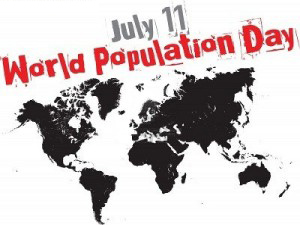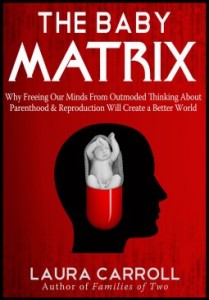World Population Day is coming up; it’s an annual event observed on July 11, and seeks to raise awareness of global population issues. The event was established by the Governing Council of the United Nations Development Programme in 1989. It was inspired by the public interest in Five Billion Day on July 11, 1987, approximately the date on which the world’s population reached five billion people.” The Population Clock shows the world population increases in real time-the last I looked it was:
7, 254,669, 851 and counting – fast. The site also lists “components of population change.” They include:
1 birth every 8 seconds
1 death every 13 seconds
Net gain of 1 person: every 12 seconds
Every time I look at the population clock, these kinds of numbers greatly disturb me. So do these, from an article by Jeremy Hance at mongabay.com:
“It took humans around 200,000 years to reach a global population of one billion. But, in two hundred years we’ve septupled that. In fact, over the last 40 years we’ve added an extra billion approximately every dozen years. And the United Nations predicts we’ll add another four billion—for a total of 11 billion—by century’s end.”
In The Baby Matrix, I talk about how although it may be technically our “right” to have as many biological children as we want and pronatalism reinforces this right, we have reached a point where this is a dangerous mindset to hold. I propose the adoption of an alternative mindset that redefines humanitarianism and patriotism when it comes bringing biological children into the world today. Here is an excerpt from the book:
The Offspring Assumption
“Yes, bearing children still remains a right under this country’s constitution. But the pronatalist assumption that we can have as many children as we want harms society and our natural environment. Given the impact of population growth on resource decline and degradation in today’s world, when it comes to our reproduction, we have an important social responsibility to that world. Each person’s existence has an environmental impact, which affects humans and other species. It’s up to us to choose reproductive action that lessens this impact.”
“..we owe it to the generations already here and those in the future (and all other beings on the planet other than human beings) to think beyond ourselves and do what we can to mitigate the population and natural resource problems that exist today. We have an obligation to leave future generations as healthy a planet as possible. And the most powerful thing we can do to this end is reduce our reproduction.
Seen in this way, having fewer offspring is not the selfish, but the selfless, act. Having fewer, not more, biological offspring is the true humanitarian act because it ultimately lessens the suffering of people and the world’s natural environment. While we may have the legal right to produce any number of offspring, we have the ability to choose to put the country’s or the world’s best interests ahead of self-interest. When we choose not to have children or to limit the number we do have because we’re mindful of the impact of each child on the planet’s resources, we show deep loyalty not only to our own country, but to the future of the world at large.”
And it is not just humans that will benefit from population reduction. The world’s biodiversity and species will as well. As Hance relays, overpopulation exacerbates the biodiversity crisis, there is a “direct correlation between the rate of population growth and the number of endangered species in a country”, and “human population density must be part of any comprehensive conservation plan.”
In other words, overpopulation has a direct effect on the Earth’s wild world. This is what led me to be passionate about bringing the second edition of Man Swarm to fruition. This book shows how overpopulation is very real, and solvable. But the most dominant being on the planet, us, needs to take responsibility and act. Man Swarm gives over 20 ways to be be part of the solution!
Original Post: July 11, 2012 Updated July 9, 2014, July 8, 2015


